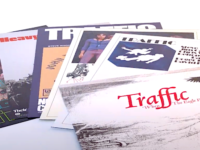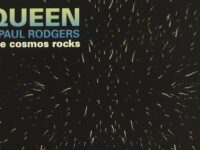Turns out, one of John Waite’s best-known songs was recorded simply as a favor, while another was made up largely on the spot — complete with an overt reference to his time in the Babys. And that’s just the story behind his 1980s-era No. 1 U.S. hits, “Missing You” and “When I See You Smile.” We also discuss a track from an often overlooked mid-1990s release that Waite says contains some of his best work, a key tune from his latest studio release, and a song that has proven over the years to have a kind of talismanic intrigue for Waite …
“WHEN I SEE YOU SMILE,” with Bad English (BAD ENGLISH, 1989): Bad English’s self-titled album was elsewhere filled with collaborative tracks that showcased an all-star amalgam featuring Waite’s old Babys bandmates Jonathan Cain and Ricky Phillips, as well as Neal Schon and Deen Castronovo — with whom Cain has subsequently worked in Journey. Yet Waite’s second American No. 1, after 1984’s “Missing You,” came courtesy of hitmaking hired-gun Diane Warren — an unusual situation for a credentialed songwriter who is so ruggedly individualistic.
JOHN WAITE: My manager wanted to see me make a hit record. She walked me into Epic, and she knew (A&R man) Don Grierson. She said: “Here he is. John Waite, ‘Missing You.’ You want him?” Don said: “Yeah.” We had this great meeting, and then I went back and Don said: “I’m going to find you some great songs to sing.” And I went: “Yeah, Don, but actually I’ve written a few of those myself.” I’m a writer, I think, before I’m a singer. But he was adamant. So, I put a band together, which turned into Bad English, so I wouldn’t have to face Don by myself. I wanted to be on Epic, so I thought: “Why don’t I do a band?” Nobody expects that. Bowie had done Tin Machine about four years before. Good idea. I probably got it from him. (Laughs.) Don was very generous, he was very kind. He’d come to the studio, and make lots of suggestions. He was just the nicest guy. So, at the end of the record, he found this one song from Diane Warren, and I said to the lads: “You know, without Don, we wouldn’t be here. Let’s cut this song as a way of saying thank you. If it works, great; if it doesn’t, we won’t put it on the record.” We cut it, and everybody knew it was a No. 1. It was like, well, doesn’t that beat all? (Laughs.) It was our thank you to Don Grierson.
“EVIL,” (ROUGH AND TUMBLE, 2011): Very emblematic of the raw approach to Waite’s most recent studio effort, “Evil” features a flinty guitar counterpoint from Matchbox 20’s Kyle Cook to go with Waite’s cutting lyric. It’s now a key moment in Waite’s new concert set Live: All Access, too. In retrospect, however, Waite says this particular track should have been even more stripped down.
[SOMETHING ELSE! INTERVIEW: John Waite discusses his sizzling 2013 concert release ‘Live: All Access,’ collaborating with Matchbox 20’s Kyle Cook, the Babys, Bad English and going happily solo.]
JOHN WAITE: “Evil” was, in fact, the demo written in Kyle’s spare room, in his house. He had an amp, with a Telecaster plugged in, and I played guitar. I took the mic off the amp, and then I’d sing a line from the song. Then he would take the mic back and put it in front of the amp. That’s what’s on the album, apart from the drums. I sent the wrong version to the mastering! The version that was going to be on the album had a drum machine behind it, and I was so overworked when I was mastering the album — I had just completed seven songs in three days; an insane amount of work — and it got by me. I still regret not having the complete actual demo on, because the demo was the master. The only thing different on the album is the bass and drums.
“MR. WONDERFUL,” (IGNITION, 1982): A song that Waite apparently just can’t help tinkering with. Originally found on his solo debut, Waite reworked “Mr. Wonderful” on his most recent studio effort with Cook — even as it became an out-of-nowhere iTunes hit in Germany. (Stream it!: 2011’s version of “Mr. Wonderful.”) The song, one of four co-written with Ivan Kral for Ignition, also finds a feature spot on Waite’s Live: All Access. Asked what prompts this fascination, Waite says it has to do with the way the track has evolved.
JOHN WAITE: It’s fun to sing. Me and Ivan, it’s one of the first things we wrote. Live, I get to sing jazz, almost. I can go outside the melody to the point where I sing some notes some nights, and I’ve gone beyond the melody in a tertiary kind of way. I’m like so far out, I’m almost into changing keys. It’s a free association. It’s like jazz, and that’s why.
“DOWNTOWN,” (TEMPLE BAR, 1995): Part of a dark-hued pair of 1990s albums, “Downtown” explores a fragile emotional moment when everything feels lost, even amid the frenetic motion of a busy metropolis — and even after having climbed to the very top of the charts. It’s a kind of raw introspection hinted at with his radio hits, but never so completely plumbed until then. With the perspective of nearly two decades, Waite still calls Temple Bar and 1997’s When You Were Mine some of his most fully realized — though undoubtedly most difficult — works.
JOHN WAITE: I think that’s the best stuff I’ve ever done. I’d left Bad English, and I was living in New York. My life was falling apart, but I was still madly in love with Manhattan. All my past was there. I had a chance to write two albums, back to back, without an A&R guy being within 10 miles of me. It was just me in the room with a band. I’d go and write a song, then come back and say: “It goes like this,” and then I’d count it in. I would do the arrangements, and tell them what else I would want to hear, and how to do it. And then we’d cut it. The songs on When You Were Mine like “Bluebird Cafe” and “Suicide Life,” and “Downtown” and “More” on Temple Bar, I don’t think I could ever get to that point again. It was a very dangerous time in my life. It took a lot to get those albums done, but they were done in the spirit of things. You only make a couple of those in your life. You’re only allowed a couple.
“MISSING YOU,” (NO BRAKES, 1984): This breakthrough charttopper begins with a nicked line from his own career, lifting the title from the Babys’ 1979 Top 20 hit “Every Time I Think of You.” After that, everything — quite literally — came tumbling out. Waite says he composed most of “Missing You” on the spot, in a move that actually isn’t all that unusual for him. He writes and writes before entering the studio, and then usually ends up improvising in front of the mic anyway.
[SOMETHING ELSE! REWIND: The Babys, who are still somehow one of rock ‘n’ roll’s best kept secrets, crafted a series of turn-of-the-1980s tunes that resonated with soul and substance.]
JOHN WAITE: Each time, I always wait until the last minute — so I can’t get out of it. I book the studio time, and then I tend to write three or four songs in a week. So I have a couple of songs in my back pocket. Then the rest of it is done on the spot. There’s enormous care taken with the lyrics, and then they’re thrown out the window. I start making up all of this shit on the spot. (Laughs.) You go back to the book, and it’s all tattered and shredded up, and you find a word or a phrase or a reference, and somehow it fits like a piece of a jigsaw. So, it’s your mind working like a blender. With “Missing You,” the first verse, bridge and chorus, I made up on the spot — without stopping. When I was writing “Downtown” with Glen Burtnik, we were playing on this old beat up piano, an old black Steinway — and it came to me: “See the old men on the Bowery, take the night train to the stars; you can find me in the usual place — inside the Temple Bar.” That was my life in Manhattan. And I’m just sitting there, and Glen’s playing. He’s always playing chords, and humming along. I came out of my seat like I had been shot out of a rocket, sang it into the mic — and there it was. I don’t know where that came from. Sometimes, it comes out so fast, if you’re not in the room with someone who knows better, you can miss it. You have to have the “record” button down most of the time!
- Nick DeRiso’s Best of 2015 (Rock + Pop): Death Cab for Cutie, Joe Jackson, Toto + Others - January 18, 2016
- Nick DeRiso’s Best of 2015 (Blues, Jazz + R&B): Boz Scaggs, Gavin Harrison, Alabama Shakes - January 10, 2016
- Nick DeRiso’s Best of 2015 (Reissues + Live): John Oates, Led Zeppelin, Yes, Faces + others - January 7, 2016




